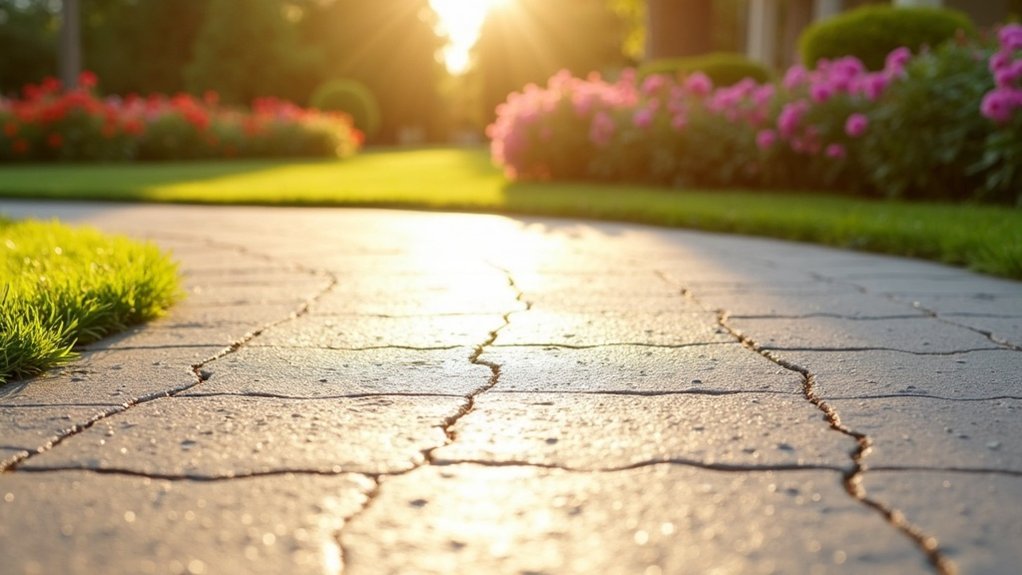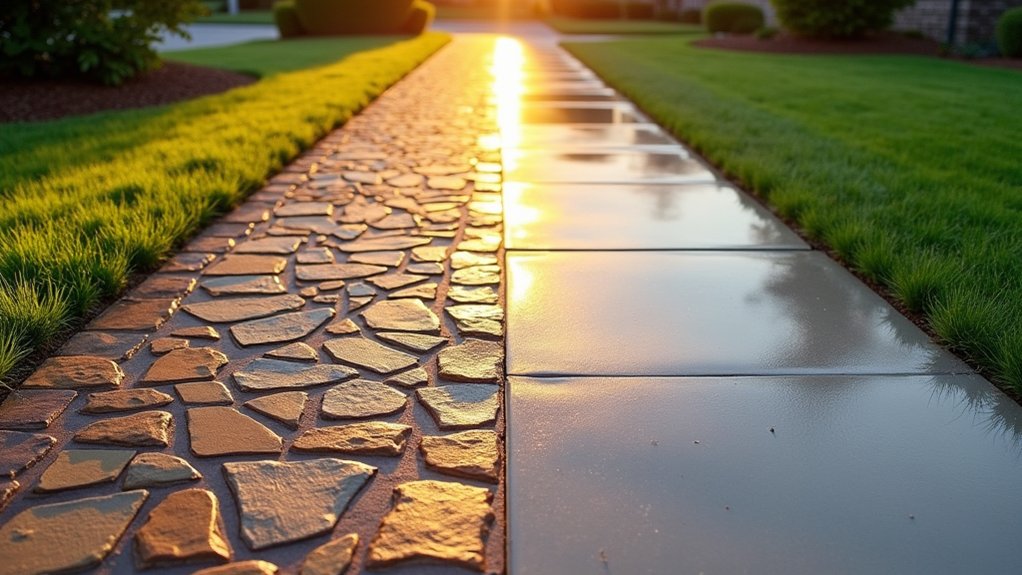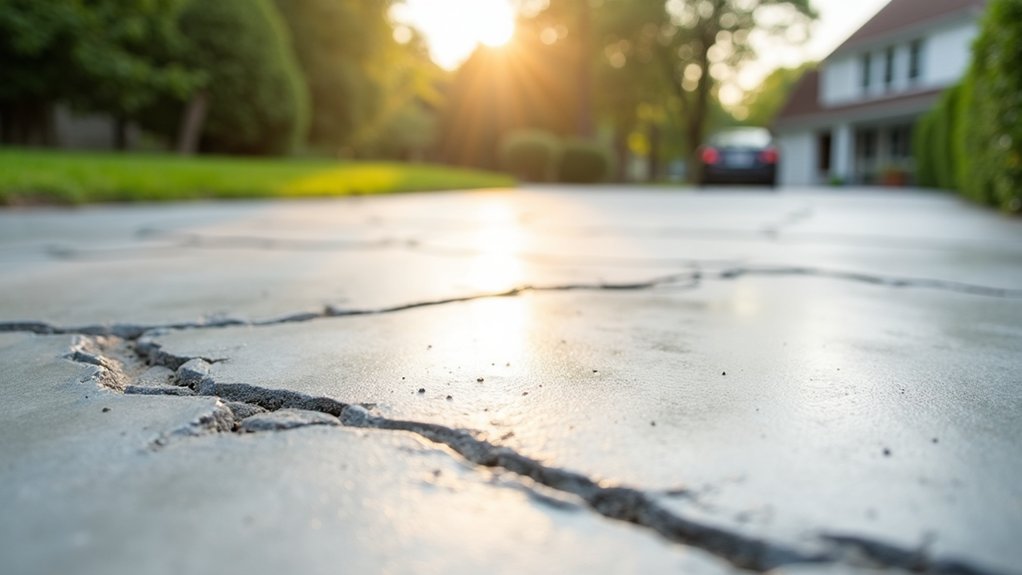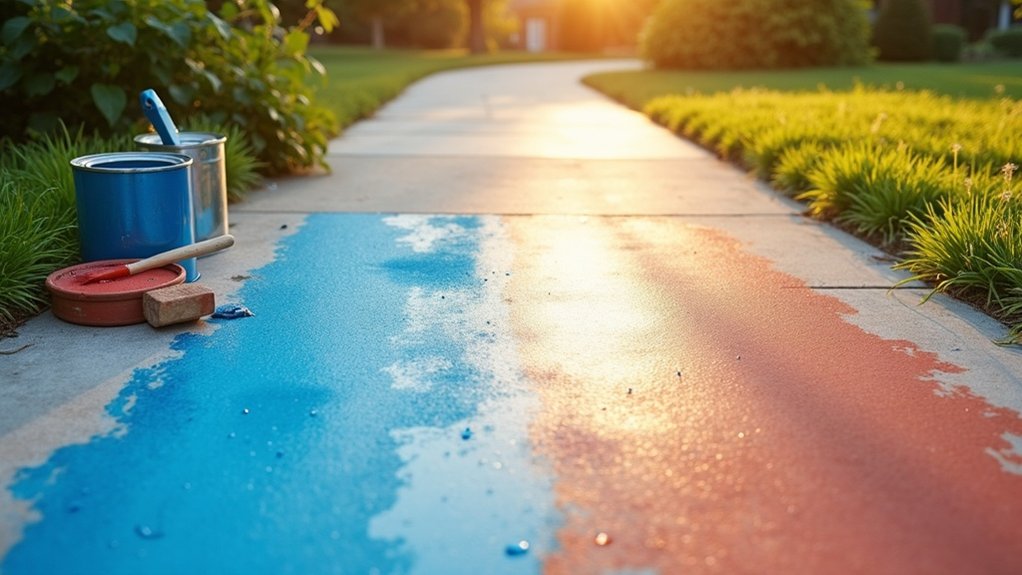For a durable driveway, choose high-strength concrete with a compressive strength of 3,000 to 4,000 PSI. This range provides a good balance of performance and cost, making it suitable for everyday vehicles. Aim for a low water-to-cement ratio of 0.40 to 0.45 to enhance durability and reduce porosity. Consider using fibre-reinforced concrete, as it offers better resistance to cracking. Additionally, exploring different finishing options can improve traction and extend the lifespan of your driveway. For further tips on maximising your driveway’s durability, there are plenty of resources available.
Table of Contents
ToggleKey Takeaways
- Opt for a high-strength concrete mix with a minimum strength of 28 MPa (around 4,000 PSI) to withstand heavy vehicles and harsh weather.
- Maintain a water-cement ratio of 0.40 to 0.50 to boost strength and reduce porosity, which helps prevent cracking.
- Consider using fibre-reinforced concrete to enhance structural integrity and minimise cracking, thereby increasing the durability of your driveway.
- Apply surface finishes such as epoxy coatings or broom finishes for extra protection, slip resistance, and a more attractive appearance.
- Regularly maintain your driveway with power washing and sealing every two years to extend its lifespan and prevent damage.
Understanding Concrete Mix Types
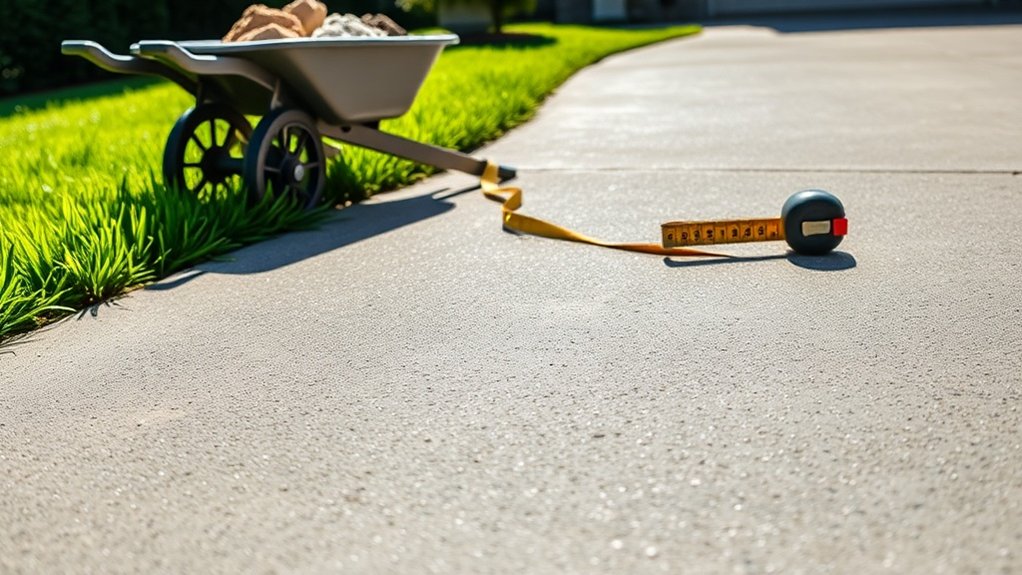
When choosing the right concrete mix for your driveway, it’s important to understand the options available. Ready-mix concrete offers reliable consistency and ease of use, while standard concrete is known for its durability, with a compressive strength ranging from 2,500 to 5,000 psi. In areas with harsh weather, standard concrete is a good choice due to its enhanced strength and resistance to the elements. For driveways that will endure heavy traffic, high-strength concrete is recommended for its longevity. Additionally, fibre-reinforced concrete can improve structural integrity and reduce the risk of cracking. You can also customise your mix for greater sustainability by using eco-friendly aggregates or additives. For the best results, choose aggregates that are suitable for your local climate and the specific purpose of your driveway, as these factors significantly influence both durability and the finish. A strong concrete mix ratio will help you make informed choices for a long-lasting and visually appealing driveway.
Importance of Concrete Strength and PSI
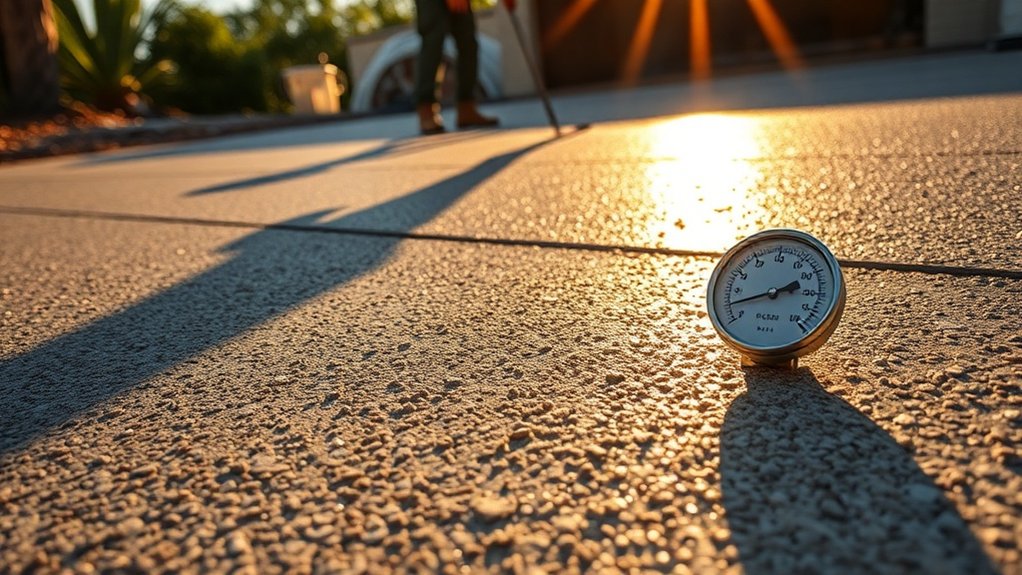
Understanding the recommended PSI levels is crucial for ensuring your driveway’s durability. A concrete mix with a PSI between 3000 and 4000 generally suffices for residential use, while heavier loads necessitate higher ratings for added strength. The strength of your concrete significantly affects its ability to resist cracking and wear, which in turn influences its lifespan and maintenance requirements. For example, if you regularly park heavy vehicles on your driveway, opting for a higher PSI can help prevent costly repairs down the line. Additionally, higher PSI concrete is more impermeable, which reduces water absorption and enhances durability against freeze-thaw cycles.
Recommended PSI Levels
Selecting the correct PSI level for your concrete driveway is crucial for its longevity and ability to withstand various loads and weather conditions. Here’s a straightforward guide to help you choose the right mix:
| Load Type | Recommended PSI Range | Environmental Considerations |
|---|---|---|
| Standard Vehicles | 2500 – 3000 | Moderate climates |
| Heavy Vehicles | 3500 – 4000 | Increased load capacity |
| Severe Conditions | 4500 | Freeze-thaw resistance |
For most residential driveways, a PSI of approximately 3000 to 4000 strikes a good balance between strength and affordability. Higher PSI ensures that your driveway can handle the demands of heavy loads and harsh weather conditions. Always keep local building regulations and specific load requirements in mind when making your decision.
Impact on Durability
Choosing the right PSI level is crucial for the durability of your concrete driveway. High-strength concrete, with its refined microstructure, has fewer voids and is less prone to cracking.
Here are three key factors to consider:
- Water-Cement Ratio: A lower ratio increases strength and reduces water permeability, leading to a more resilient surface.
- Admixtures: Adding air-entraining agents can improve resistance to freeze-thaw cycles, making it ideal for the UK climate.
- Curing Techniques: Proper curing retains moisture, ensuring effective hydration and density in the concrete.
These factors work together to extend the life of your driveway. By following best practices, you not only enhance durability but also reduce the need for ongoing maintenance.
Focus on these elements to create a strong, long-lasting surface that can withstand the challenges of weather and wear.
Water-to-Cement Ratio for Optimal Durability
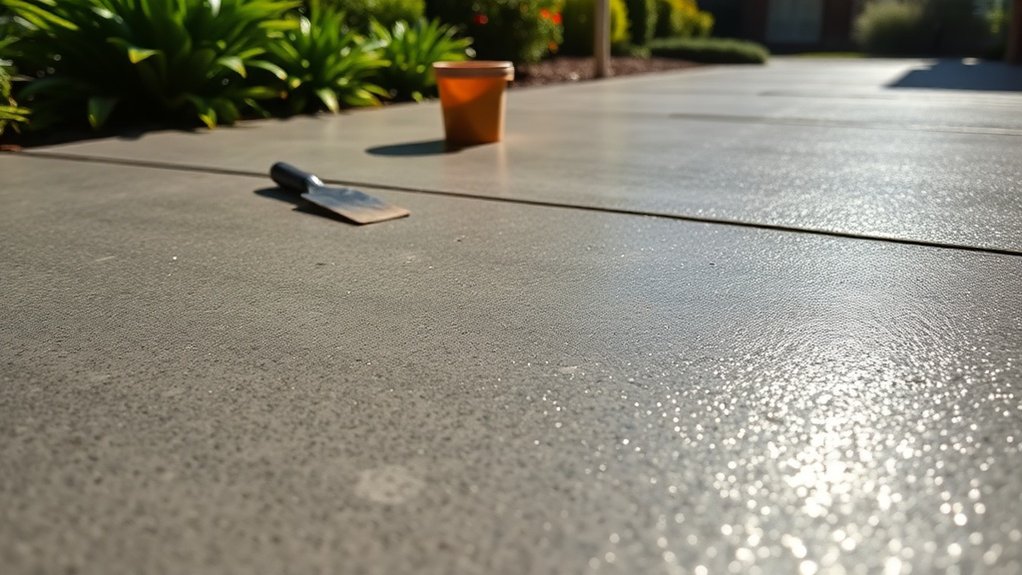
The water-cement ratio (w/c) is crucial for the durability of concrete, especially when building a long-lasting driveway. An ideal w/c ratio between 0.40 and 0.50 optimises strength and minimises porosity, both important for durability. Here’s a brief overview of how different ratios affect durability:
| Water-Cement Ratio | Effects on Durability |
|---|---|
| 0.40 – 0.45 | High strength, low porosity |
| 0.50 – 0.55 | Moderate strength, increased porosity |
| 0.60+ | Low strength, higher risk of cracking |
Lower ratios improve cement hydration and reduce the negative effects associated with excess water, while higher ratios require careful adjustments to maintain structural integrity. Aim for precision in your mix design for the best results.
The Role of Aggregate Types in Driveway Longevity
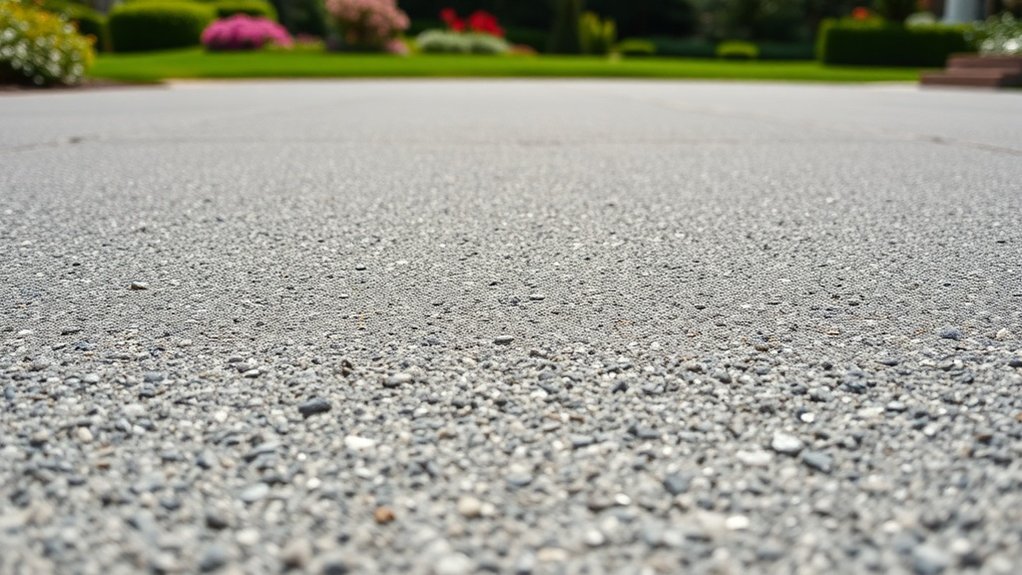
The durability of your driveway relies not only on the water-cement ratio but also on the type of aggregates you select. Choosing the right aggregates can improve both their longevity and appearance.
Here are some key considerations:
- Type of Aggregate: Crushed stone, such as granite, offers exceptional strength, while limestone can provide a visually appealing range of colours.
- Size and Shape: Angular aggregates create a better mechanical interlock, which enhances structural integrity compared to rounded aggregates.
- Permeability: Gravel aggregates improve drainage, minimising water pooling and reducing the risk of freeze-thaw damage.
Surface Finishing Options for Enhanced Performance
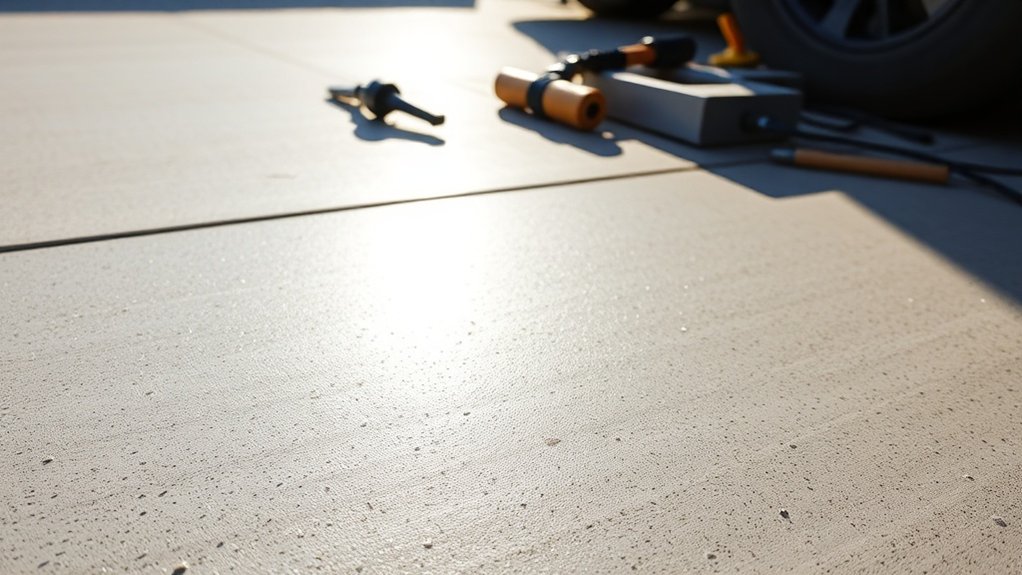
When choosing surface finishing options for your driveway, epoxy coatings provide excellent protection against wear and chemical damage, as well as enhancing the overall look.
Textured concrete finishes can boost traction and visual appeal, making them ideal for outdoor use.
Epoxy Coatings Benefits
When considering surface finishing options for your driveway, epoxy coatings are a top choice due to their impressive durability and protective features.
Here are three key advantages of epoxy coatings:
- Durability: Epoxy forms a robust surface that can withstand cracking and wear, keeping your driveway intact even with heavy use and varying temperatures.
- Chemical Resistance: These coatings offer protection against damaging substances like salt and oil, creating impermeable barriers that guard your concrete from moisture and environmental harm.
- Safety Enhancements: Epoxy surfaces enhance slip resistance and visibility, helping to reduce risks associated with wet or icy conditions.
In short, epoxy coatings provide a reliable and safe solution for maintaining your driveway.
Textured Concrete Finishes
Choosing the right textured concrete finish can significantly improve the performance and safety of your driveway. Here’s a brief comparison of popular options:
| Finish Type | Key Features | Benefits |
|---|---|---|
| Broom Finish | Fine textured grooves, slip-resistant | Affordable, practical appearance |
| Rock Salt Finish | Irregular speckles for traction | Decorative, moisture-resistant |
| Exposed Aggregate | Reveals embedded stones, highly textured | Durable, visually appealing |
Broom finishes offer excellent slip resistance, while rock salt adds a decorative touch at a reasonable cost. Exposed aggregate not only enhances safety but also provides a natural look. For a more decorative finish, consider stamped concrete, which mimics natural materials, or sandblasted textures that provide a modern feel with easier upkeep. Each option effectively balances performance and style.
Environmental Considerations for Concrete Driveways
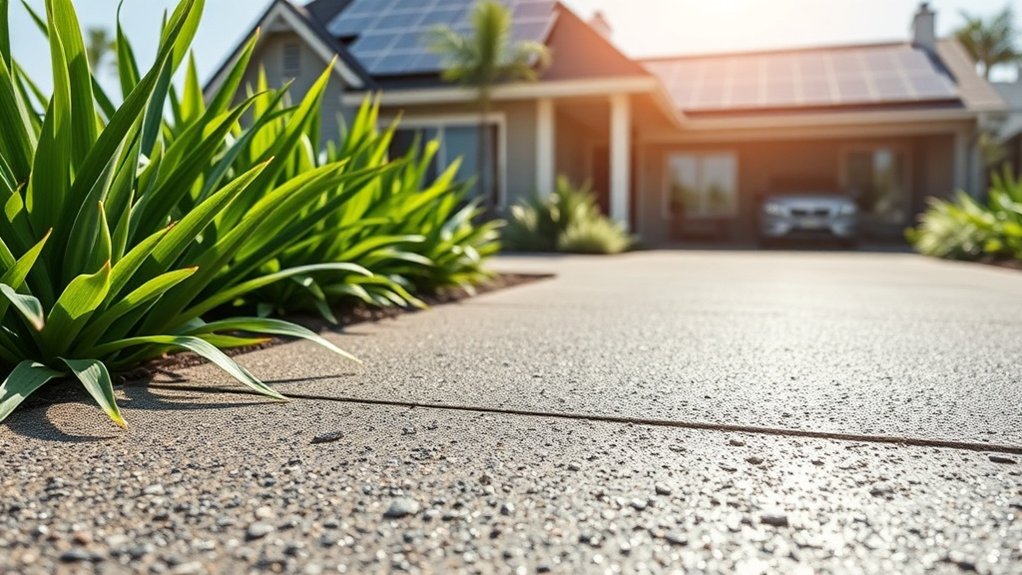
When considering the environmental impact of concrete driveways, it’s important to be aware of the significant carbon footprint linked to cement production, which accounts for about 8% of global CO2 emissions.
Adopting sustainable practices can help reduce these effects.
- Use eco-friendly materials, such as recycled aggregates, fly ash, or slag, in your concrete mix.
- Choose permeable concrete options to effectively manage stormwater, reducing runoff and encouraging groundwater recharge.
- Source materials locally to minimise transportation emissions, thus improving the environmental profile of your driveway.
Benefits of Using Ready Mix Concrete
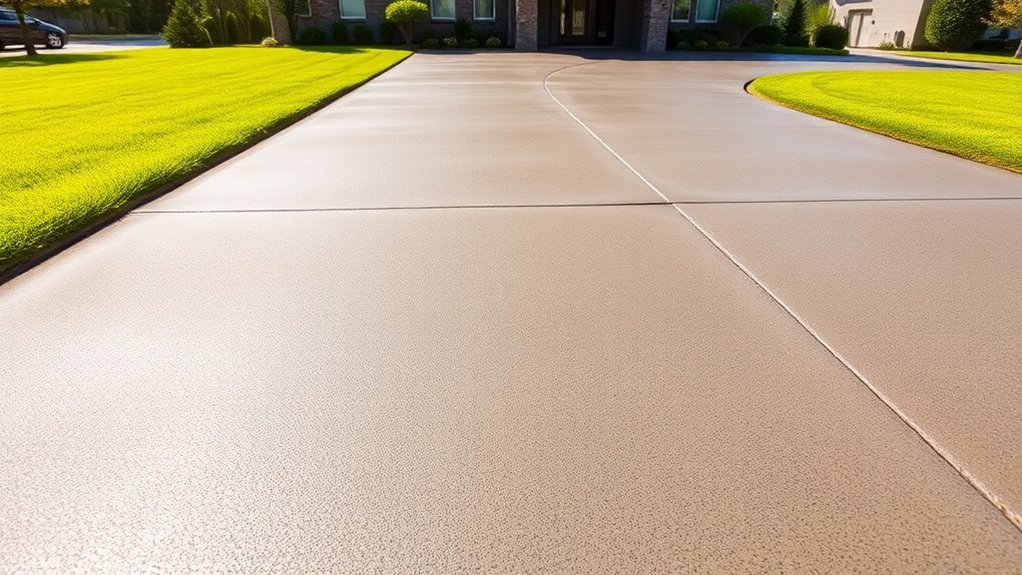
Choosing ready-mix concrete for your driveway offers several advantages. Firstly, it ensures consistent quality, as the concrete is produced under strict quality control measures. This means you get a reliable product with a precise mix that enhances strength and reduces imperfections.
The production process, carried out in a factory, minimises variability, resulting in concrete that can withstand the rigours of the British weather.
Another key benefit is time efficiency; ready-mix concrete arrives fully prepared, allowing for immediate pouring and cutting down on labour costs. With proper delivery planning, you sidestep potential delays that can arise from mixing on-site.
Moreover, ready-mix concrete can be customised to suit your specific requirements, whether that’s adapting to local climate conditions or intended use.
High-Strength Concrete for Heavy Traffic Areas
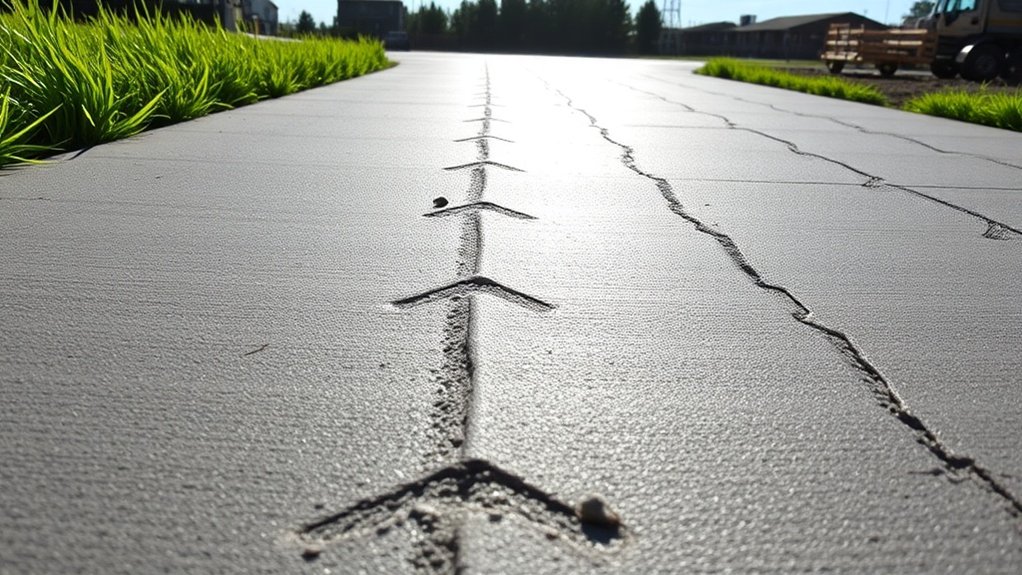
When building driveways in high-traffic areas, it’s essential to use concrete with a compressive strength of at least 4,000 to 5,000 PSI to ensure durability under heavy loads.
The right mix, which includes a suitable water-cement ratio and quality aggregates, is crucial for achieving this strength.
Compressive Strength Requirements
Choosing the right compressive strength for your driveway is crucial, especially in busy areas.
To ensure durability and load-bearing capacity, consider the following:
- 3,000–4,000 psi (20-28 MPa): Suitable for residential driveways accommodating standard vehicles.
- 4,000 psi (28 MPa) or higher: Recommended for heavier vehicles like vans or caravans in high-traffic scenarios.
- 5,000 psi (35 MPa) or more: Required for commercial or industrial driveways with heavy load demands.
Selecting the correct compressive strength is vital for your driveway’s ability to handle weight and resist cracking.
Concrete over 4,000 psi provides better durability but may come at a higher cost and be trickier to place.
Always conduct lab testing to ensure it meets your design specifications.
Ideal Mix Components
Choosing the right compressive strength is crucial for creating the ideal mix components needed for high-strength concrete, especially in areas with heavy traffic.
Start with Portland cement as your main binder, ensuring a cement content of over 400 kg/m³ for a robust matrix. Consider adding supplementary cementitious materials like fly ash or silica fume to boost durability.
Aim for a water-to-cement (w/c) ratio between 0.40 and 0.50 to optimise strength, and use superplasticisers to enhance workability without increasing water content.
Select well-graded, clean aggregates for structural integrity. Incorporating steel or synthetic fibres can help reduce cracking and improve impact resistance.
Fiber-Reinforced Concrete for Increased Integrity
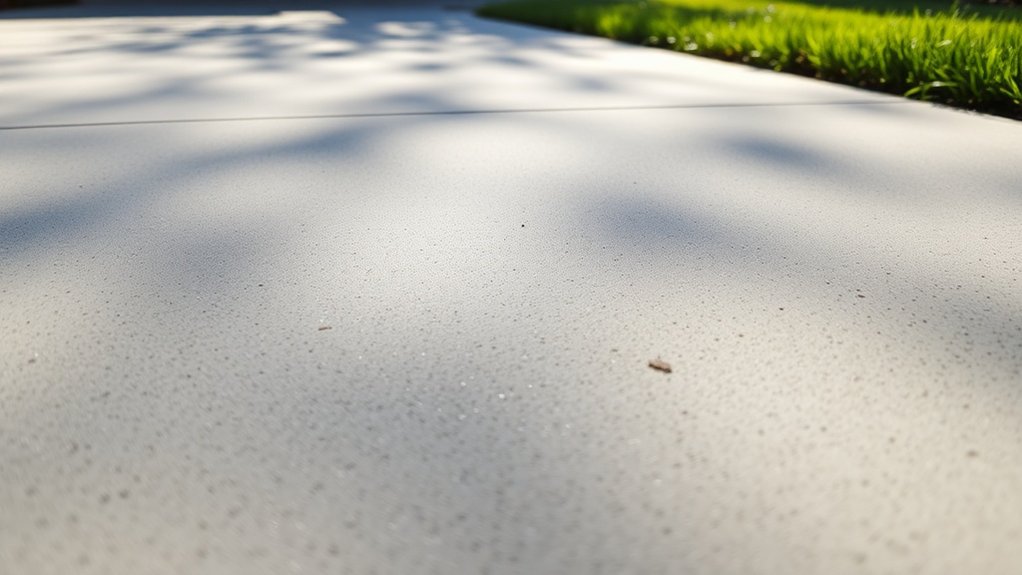
Fiber-reinforced concrete (FRC) significantly improves the integrity of driveways by incorporating fibres into the mix, providing an internal reinforcement system.
This modern method offers several advantages:
- Enhanced Durability: FRC reduces the likelihood of cracks forming and spreading, which prolongs the life of your driveway.
- Increased Resistance: The fibres boost impact and fatigue resistance, making it ideal for driveways that endure heavy traffic.
- Mix Customisation: You can select from different fibre types—steel, synthetic, or natural—to meet your specific performance needs.
Specialty Mixes for Unique Soil and Climate Conditions
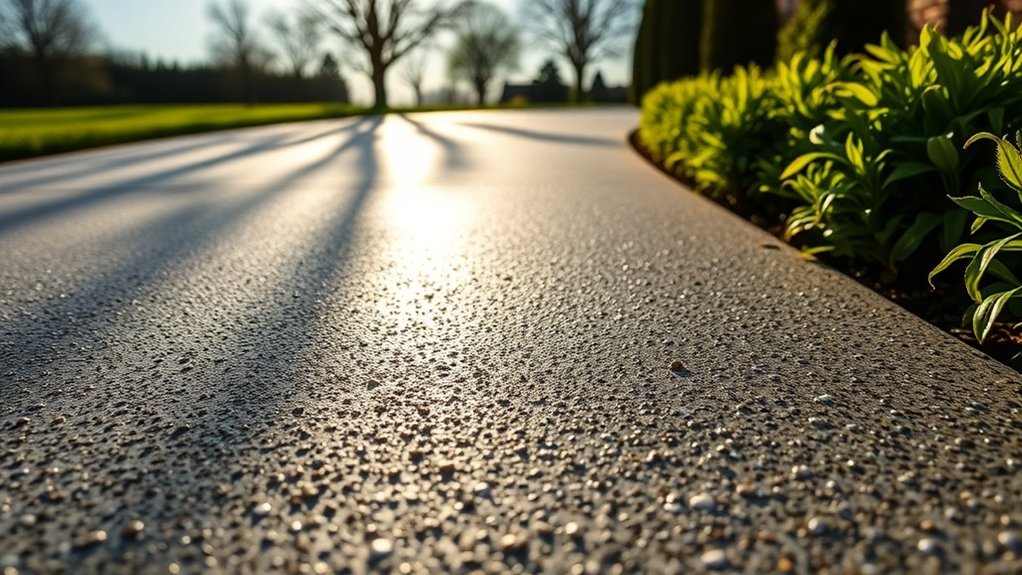
While fibre-reinforced concrete boosts durability, it’s essential to acknowledge that varying soil types and climate conditions require bespoke concrete mixes for optimal performance.
For cold environments, use air-entraining admixtures to enhance freeze-thaw resistance. In areas with expansive or clay soils, shrinkage-reducing admixtures can help stabilise the soil and reduce permeability, preventing water infiltration.
In hot, dry climates, incorporating retarders slows curing and reduces the risk of cracking. Permeable mixes can also assist in managing drainage, which helps prevent frost damage.
If your driveway is exposed to chemicals, opt for low-permeability mixes with corrosion inhibitors. Each of these specialised mixes is crafted to ensure your driveway endures specific environmental challenges, improving both its longevity and functionality.
Maintenance Tips for Prolonging Driveway Life
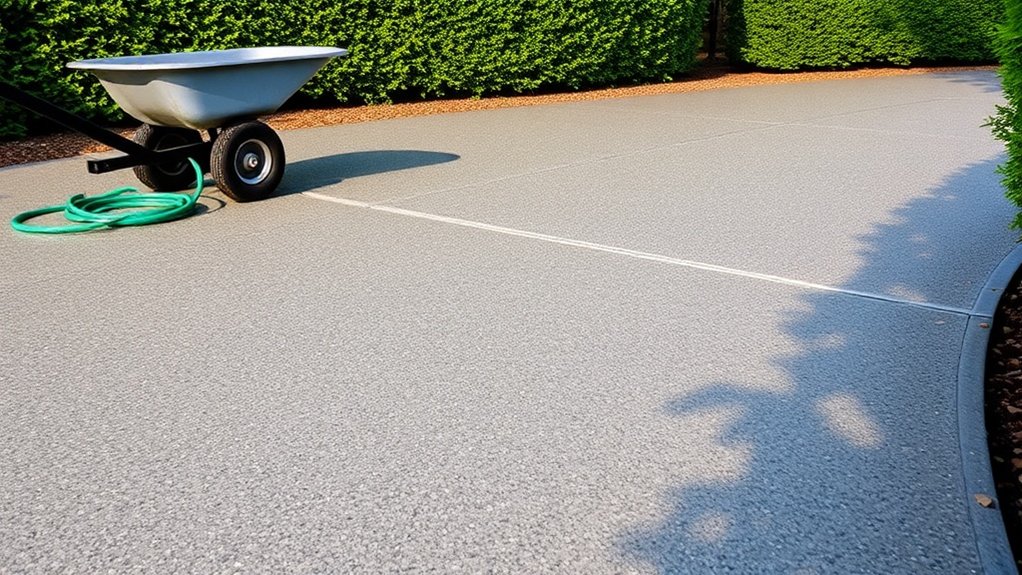
To keep your driveway both durable and attractive, regular maintenance is key. Here are some straightforward tips:
- Power Wash: Clean your driveway every six months to remove dirt and grime.
- Seal Regularly: Apply a concrete-specific sealer every two years, or as needed, to guard against stains and water damage.
- Check for Cracks: Regularly inspect for cracks and repair them promptly to prevent further issues. Proper crack preparation is essential for effective repairs.
Seasonal maintenance routines can significantly extend your driveway’s lifespan.
Use eco-friendly cleaning products to protect the surface and avoid harsh chemicals that could damage the concrete.
Additionally, prevent water accumulation and refrain from parking heavy vehicles on it to reduce stress on the surface.
Frequently Asked Questions
How Long Does It Take for Concrete to Cure Fully?
Concrete generally needs a curing time of 28 days to achieve its full strength. It’s important to keep the concrete moist during this period to prevent cracking and ensure its long-term durability. For example, if you’ve poured a new driveway, covering it with wet burlap or plastic sheeting can help maintain the right moisture levels.
Can I Pour Concrete in Cold Weather?
Yes, you can pour concrete in cold weather, but it’s essential to take precautions. For instance, use insulated blankets or heaters to maintain the concrete temperature and ensure proper curing. This helps prevent issues like freezing, which can compromise the strength and durability of the concrete.
What Is the Best Time of Year to Pour Concrete?
The best time to pour concrete is in spring or early autumn. These seasons provide mild temperatures, which help prevent rapid drying that can occur in summer heat. This ensures ideal curing conditions for strength and durability. Proper planning is key.
How Can I Fix Cracks in My Driveway?
About 90% of driveway damage is caused by untreated cracks. To repair cracks in your driveway, start by cleaning the area thoroughly. Next, select the appropriate crack filler, and apply it correctly for effective maintenance. For example, if you have a small crack, a liquid filler should suffice, while larger cracks may require a more robust solution. Taking these steps will help prolong the life of your driveway.
Are There Specific Tools Needed for Mixing Concrete?
Yes, you’ll need shovels, buckets, and possibly a portable mixer for effective mixing. It’s important to maintain your tools to ensure they perform well. For larger batches, consider using power tools to improve efficiency and consistency in your concrete mixing.
Conclusion
Choosing the right concrete mix for your driveway is straightforward—provided you pay attention to the water-to-cement ratio! A strong mix, the correct aggregates, and possibly a fibre-reinforced option can result in a driveway that endures heavy traffic and harsh weather. Keep in mind that neglecting maintenance won’t extend its lifespan. If you want a durable surface, invest time now; otherwise, you’ll be left with a driveway full of potholes later!
Just how do stamped and plain concrete driveways compare in durability, cost, and aesthetics? Discover which option truly suits your Read more
Knowing whether your concrete driveway needs expansion joints could save you from costly repairs—discover the importance of these joints for Read more
Before painting your concrete driveway, discover the pros and cons that could impact your decision—what will you choose for your Read more

